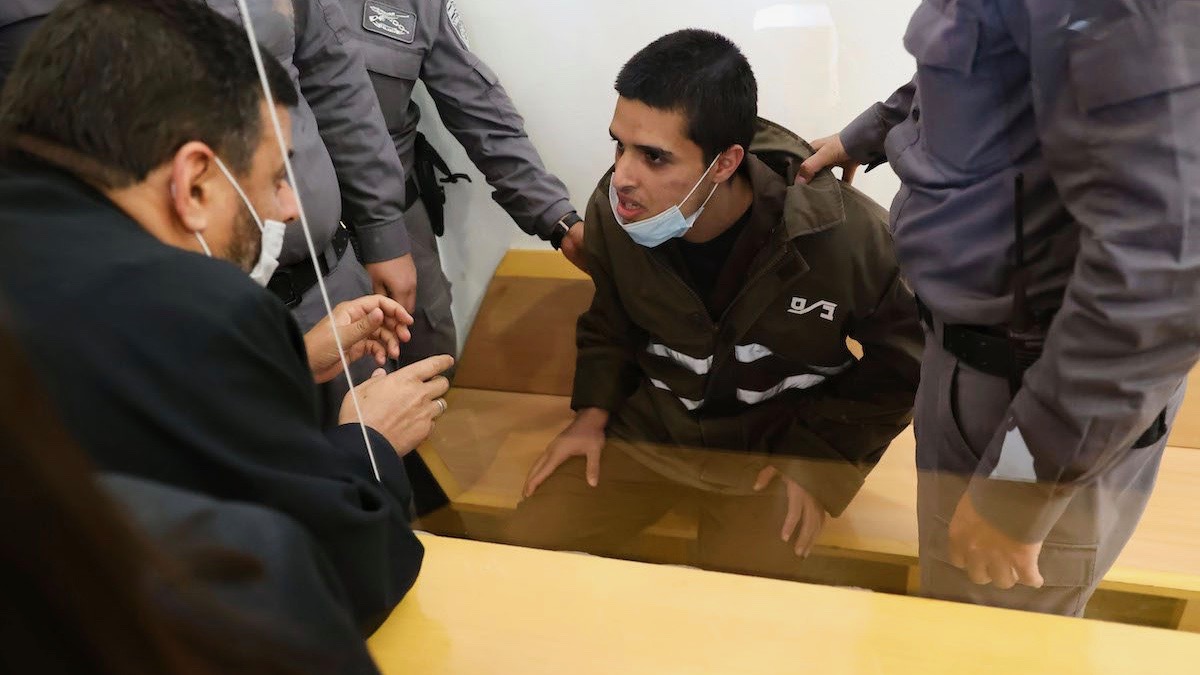An Israeli court rejected the early release appeal of Ahmad Manasra, a 20-year-old Palestinian political prisoner who has spent the past seven years incarcerated in the Israeli prison system, on Monday June 27. For the past few months, Manasra’s case has gained international attention through the social media-based #FreeAhmadManasra campaign, which has called on the occupation court to immediately release the young prisoner who suffers from severe mental health conditions. The following is a timeline of his case:
Arrest, 2015: 13-year-old Manasra was arrested in October 2015 for being with his cousin, Hassan Manasra, when he allegedly carried out a stabbing attack in the illegal Pisgat Ze’ev settlement, injuring two settlers. While his cousin was shot on the spot by Israeli police, Ahmad Manasra was brutally assaulted by a settler mob and run over by a car, leading to fractured skull and other injuries. The child prisoner was subject to violent interrogation and torture with an electronic bracelet, as seen in a leaked video that has been cited by rights groups.
Sentencing, 2016: Although he was arrested in 2015, the Israeli occupation court waited until he reached the minimum criminal responsibility age of 14 in November 2016 to give Manasra a 12-year sentence (later reduced to nine years) for attempted murder. A new 2016 law now allows the courts to convict minors.
Parole case, February 2022: After the completion of more than two-thirds of his sentence, Manasra’s legal team applied for a case review that would allow him to be released on parole. In February, Manasra was diagnosed with schizophrenia, after physical and psychological abuse in jail including a period of solitary confinement that began in November. Manasra’s case review was rejected by the occupation court on February 7th.
Launch of Free Ahmad Manasra campaign, March 2022: On March 6, the Palestine-Global Mental Health Network (PGMHN) released a statement calling for the immediate release of Ahmad Manasra due to the inhuman and racist conditions of his incarceration. The statement calls out the Israeli apartheid system’s treatment of Manasra, who was “detained in an institution away from his family and denied the bare necessities of care” during the year he spent prior to sentencing, at the age of 13. The statement also identifies Manasra’s extended placement in solitary confinement as torture, according to international law. The statement goes on to bring attention to “the complicit and abhorrent silence of the international community that watches Palestinian unchilding at the hands of the Israeli racial state.” The PGMHN also circulated a petition that has since accumulated nearly half a million signatures.
Appeal, April 2022: Following the launch of the Free Ahmad Manasra campaign, the occupation court set April 13 as the date to hear an appeal for Manasra’s case. During the April hearing, Manasra’s case was transferred to a “Special Committee,” to potentially reclassify it and allow for an early release, which would be determined in June. On April 17, Manasra’s solitary confinement period was extended for another six months.
Court hearing, June 2022: On June 13, Manasra was transferred from his cell to a prison hospital, in anticipation of his trial on June 19. Wafa reported on a meeting between Manasra and his lawyer, Khaled Zabarka, who recounted Manasra’s inability to communicate, as well as the wounds on his body. Numerous rights organizations, including Amnesty International, called for Manasra’s immediate release. Doctors and psychiatrists associated with the PGMHN presented a medical letter that detailed the gravity of his situation and demanded his release. Following the court session on June 19, the occupation court classified Manasra’s case as terrorism, in a move that his defense team called “legally and constitutionally flawed.” One week later, the court rejected the appeal for his release.
Ahmad Manasra’s case is just one example of a much larger phenomenon of child incarceration under the Israeli apartheid state. Citing Defence for Children International-Palestine, the PGMHN asserts that “Ahmad’s case is an integral part of a vengeful and retaliatory colonial system that every year detains ‘approximately 500-700 Palestinian children, some as young as 12 years old, who are detained and prosecuted in the Israeli military court system.”





